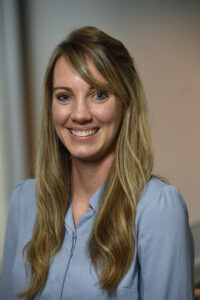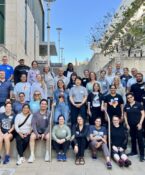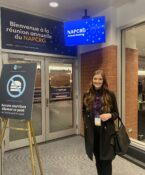HSC to host HIV Symposium
- April 24, 2024
- By: Eric Griffey
- On Campus
Related Links
 HIV remains a major global health issue, with an estimated 40 million people living with HIV worldwide. About 10 million of them, including about half of infected children, do not have access to treatment.
HIV remains a major global health issue, with an estimated 40 million people living with HIV worldwide. About 10 million of them, including about half of infected children, do not have access to treatment.
From 9:30 a.m. to noon on Monday, health care providers working on the frontlines of the HIV epidemic and a panel of experts will be discussing these issues and more at The University of North Texas Health Science Center at Fort Worth.
The HIV Symposium, “Bringing Together Future Health Care Practitioners and Champions in HIV Care to Tackle Challenges and Work Toward Ending the HIV Epidemic,” will be held in the university’s Carl E. Everett Education & Administration Building in the first-floor atrium and an adjoining classroom, EAD 108. This event is free and open to the public.
The symposium was organized by Amanda Brosnan, a physician assistant and assistant professor in the HSC School of Health Profession’s physician assistant program, and is produced through the AIDS Education and Training Center’s TAKE on HIV grant. Part of the grant’s goal is to incorporate the National HIV Curriculum into health professions programs. Additionally, HSC’s Center for Health Policy is an AETC local partner site.
“Integration of HIV learning opportunities into health professions programs via the TAKE on HIV program ultimately supports enhancing the quality and accessibility of HIV care and supports efforts to end the HIV epidemic in the U.S.,” said Dr. Waridibo Allison, HSC’s vice president of health policy and director of the university’s Center for Health Policy. She is also the primary investigator for AETC on the project.
 This symposium comes on the heels of news that the U.S. is lagging behind other developed countries in eradicating HIV. A report by Centers for Disease Control and Prevention estimated that new HIV transmissions in the U.S. declined by 12% between 2017 and 2021 compared with a 70% drop in countries like the Netherlands and Italy.
This symposium comes on the heels of news that the U.S. is lagging behind other developed countries in eradicating HIV. A report by Centers for Disease Control and Prevention estimated that new HIV transmissions in the U.S. declined by 12% between 2017 and 2021 compared with a 70% drop in countries like the Netherlands and Italy.
Medications in recent years have allowed some people living with HIV to have almost the same life expectancy as the general population. A series of landmark studies also found that when people without HIV take the antiretrovirals Truvada or Descovy daily as pre-exposure prophylaxis, or PrEP, they reduce their risk of contracting the virus by 99% or more.
The symposium’s two guest speakers each work with those living with HIV and on critical research. Eric Klappholz, APRN, ANP-C, is a physician assistant at Dallas’ MD Progressive Care. He specializes in HIV treatment, PrEP, transgender health, sexual health, hormone replacement and LGBTQIA+ primary care. Amanda Miller, MPH, MPAS, PA-C, AAHIVS, CAQ-Psych, is a physician assistant at CentroMed in San Antonio. She has considerable experience in public health, with clinical experience in HIV, including pre- and post-exposure prophylaxis, sexually transmitted infections and viral hepatitis.
The pair’s presentation, “Status-Neutral Approach to Ending the HIV Epidemic,” will explore this groundbreaking comprehensive system of prevention that includes all people affected by HIV, regardless of their HIV status. Considered a “whole person” approach to health care and delivery, status-neutral HIV prevention and care seeks to address social and structural barriers to engagement in prevention, care and treatment.
Lonnetta Wilson, Tarrant County HIV Administrative Agency’s HIV initiatives program manager, will lead a panel of community members in a discussion on the stigma often associated with HIV.
“With this symposium, we hope to bring together students, health care providers and community members to tackle HIV from different angles and work together to end the epidemic,” Brosnan said.
“Through use of the National HIV Curriculum, students have been able to read and learn about HIV,” she continued. “This symposium offers our students and community members a chance to not only learn about these topics but engage with them in an interprofessional environment and truly translate learning into action. Topics such as stigma, pre-exposure prophylaxis, rapid initiation of treatment and sexually transmitted infections all have impacts on the HIV epidemic.”
The symposium’s programing will conclude with HSC School of Health Professions student presentations on HIV care and topics pivotal to ending the epidemic.
To register for the event, follow this link.





Social media